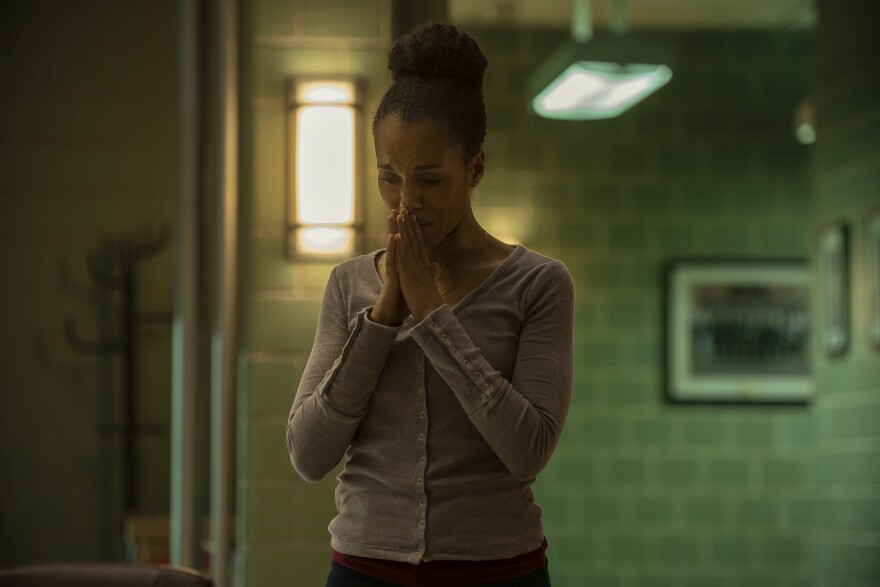Netflix is the perfect home for low-budget stage adaptations, and the service should really be churning them out with the same frequency as its stand-up specials. Its take on American Son, the hyper-topical drama by Christopher Demos-Brown that premiered on Broadway last year, isn't trying to be fancy. The film is almost entirely contained inside the police station that serves as the show's setting, with occasional, unnecessary flashbacks to other moments and moods. Mostly it traps us in a moment we desperately want to look away from: the liminal space of a mother not knowing if her son is OK.
In the beginning it works. Stuck in a drab waiting room with nothing but some couches for awkward sitting, Kendra (Kerry Washington) struggles to extract any useful information on her son's whereabouts from the rookie officer on duty (Jeremy Jordan), a baby-faced prick who won't hide his casual racism. ("Did he have any distinguishing ... gold teeth?") The dark hallways echo with indifference, and the thunder outside rages. There's no escape from the terror of not knowing.
Washington's performance is still pitched at a stage level: full of volcanic, play-it-to-the-rafters anguish. She spends most of the drama in a defensive crouch, fighting off the bureaucracies keeping her in that waiting room, and absorbing tongue-lashings from the men around her. When she does strike back, it's usually to draw our attention to the deeper strands of racism that inform her anxiety over her son: invoking names like Tamir Rice and Philando Castile, or speculating as to why the old police station might have two drinking fountains right next to each other. Washington delivers these cuts with the reluctance of someone who knows she's about to be pigeonholed as yet another mouthy black woman.
If the film was just 90 minutes of a terrified black mother getting stonewalled by a white cop, it'd be unwatchable ... and it'd reduce Washington's textured expression of pain to a stock role. So in many ways it's Steven Pasquale, making a delayed entrance as Kendra's estranged white husband Scott, who has to move things forward. Scott is a domineering FBI agent who's carefully nurtured a lifetime of ambitions within his son, from fancy prep school to a projected law enforcement career via West Point. "The men in my family have served this country every generation since they got here," he thunders, with no room for deviation.
But what's odd about Scott, both as he's performed by Pasquale and written by Demos-Brown, is how cluelesshe is. The character doesn't act like someone who fathered and raised a mixed-race son for 18 years and built a relationship with a black woman for at least that long. He acts like someone who's never had more than one conversation with a black person in his life. He's shocked to hear that his son might want to befriend other black men outside his social circle. He's shocked to imagine his son could become a victim of racial profiling. He's shocked to realize, in general, that his son won't respond to the social stigma of the modern world the same way a white one would — all facts that Kendra, in her darkest hour, has to explain to him, so that she can also explain these things to us.
Maybe this obtuseness is the point, since Scott's meant to be a lousy husband and father. And playwrights have to heavily underline the conflicts they create between a tiny handful of characters trapped in an enclosed space. And yet, here's a dad who's a complete alien to his own family, ranting about Black Lives Matter as he stands next to a black woman he supposedly once loved. He's no different from any other bozo with a badge. (Critic Soraya Nadia McDonald, in her review of the Broadway production, mused these characters "have been grown in separate petri dishes.")
Scott turns out to be the harbinger of a reductiveness that bleeds into the rest of the story, a naked desire to force drama into metaphors it can't hold. Every twist is built around the reveal of either a character's race or their racially motivated actions, both easy shortcuts to catharsis. It never gets bad enough to completely undo the emotional impact of watching a parent's worst fears gradually realized, but it doesn't help the production's lofty goals, either. Peep the grandiosity of that title again.
Some film directors who adapt stage works believe it's their job to fool us into thinking we're not watching a play, because plays aren't cinematic enough. They're wrong. The play is all we need, provided it's good enough to merit the adaptation in the first place. American Son is so explosive and angry that helmer Kenny Leon, who also directed the play on Broadway, gets out of its way entirely. Which means now we can see, a little too clearly, that the show doesn't wield its anger responsibly. The next time Netflix goes sniffing around Broadway, it should bring back something with brains to match heart.
Copyright 2021 NPR. To see more, visit https://www.npr.org. 9(MDAxODg3MTg0MDEyMTg2NTY3OTI5YTI3ZA004))



